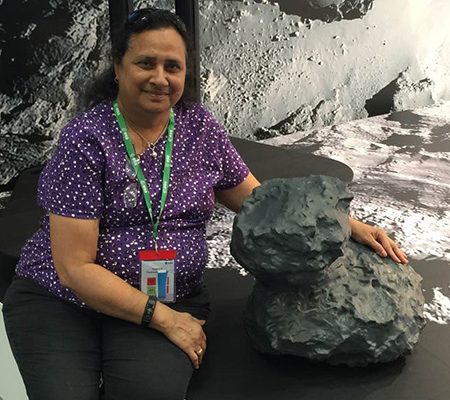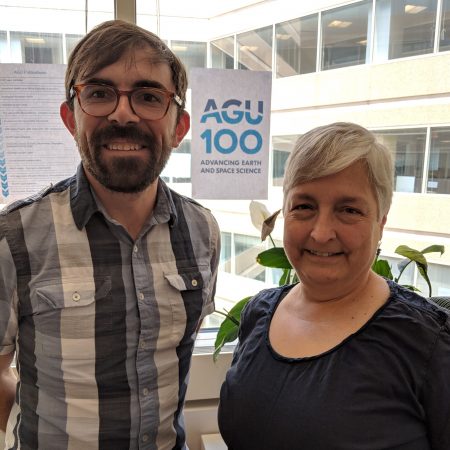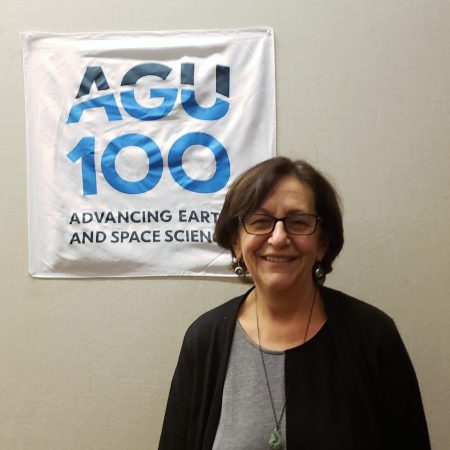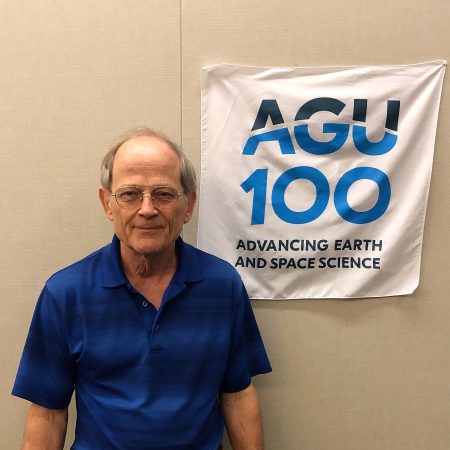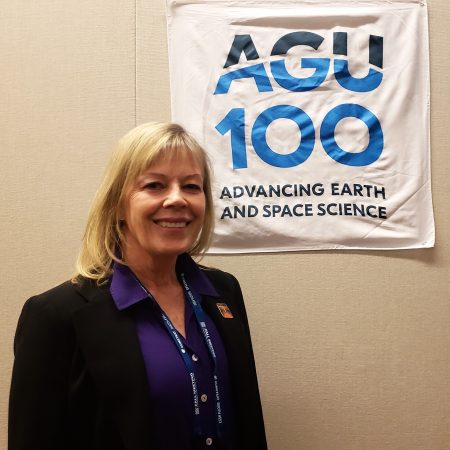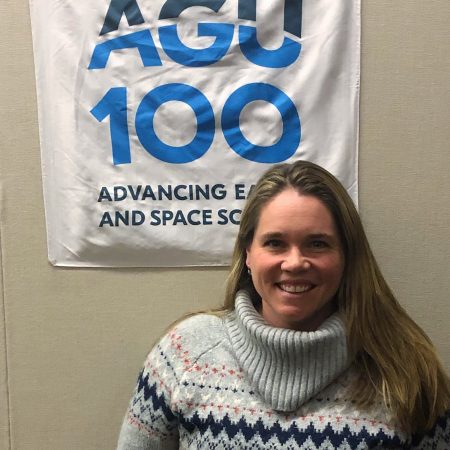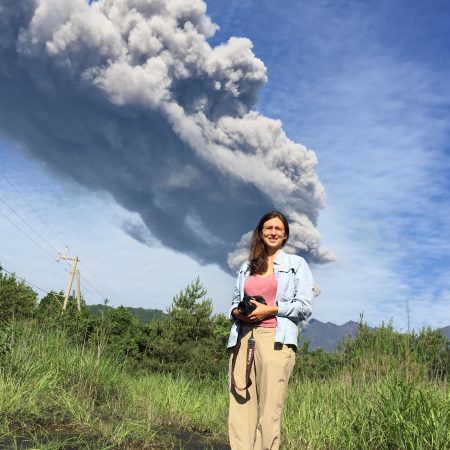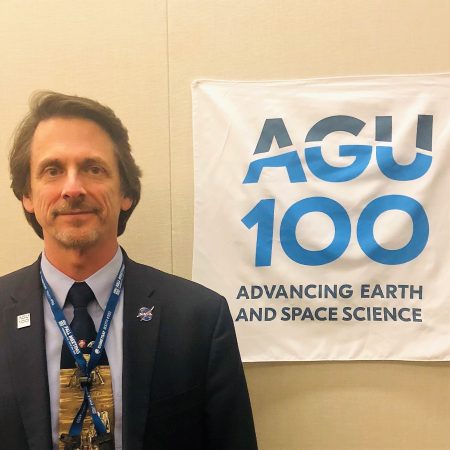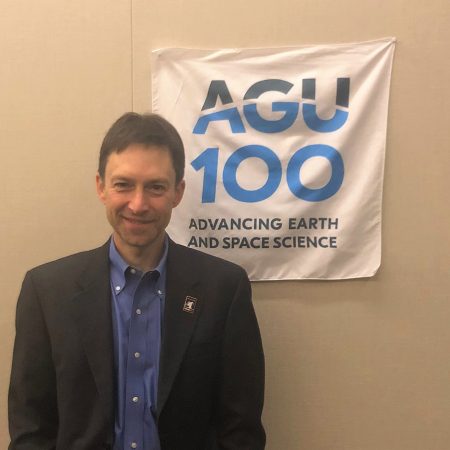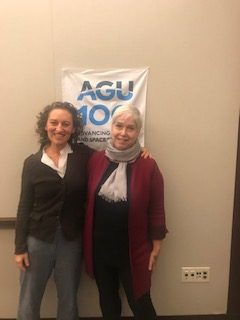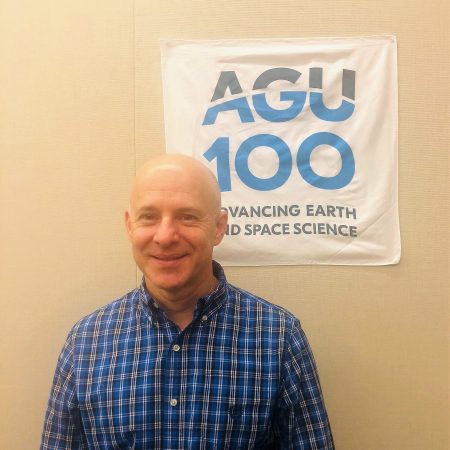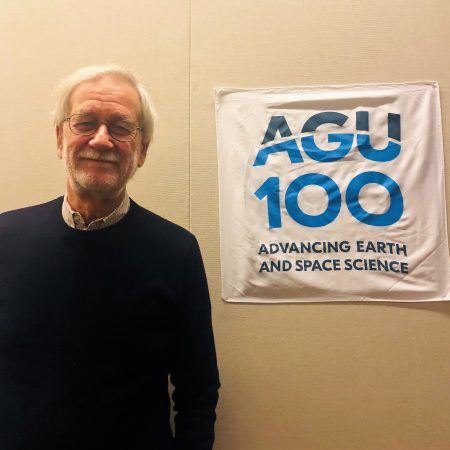Refine
Date Range Clear
Recorded by Clear
Keywords Clear
- volcanolgy 81
- Venus 81
- mars 81
- NASA 61
- #womeninscience 29
- Mt.St.Helens 81
- #AGU 81
- #AGU100 80
- discovery 44
- Advice 19
- planetary 15
- data 13
- 232 more
Partnerships Clear
- No matching terms.
Organizations Clear
- American Geophysical Union 21
- National Aeronautics and Space Administration 7
- Ameican Geophysical Union 1
- Ameican Geophysican Union 1
- American Geophsyical Union 1
- 4 more
Places Clear
- Washington DC 84
- AGU 2018 Fall Meeting 78
- AGU Fall Meeting Program Commitee 2
- AGU2018 Fall Meeting 1
- American Geophysical Union 1
- 2 more
Languages Clear
- No matching terms.
Initiatives Clear
- No matching terms.
Glenn Orton is so deep in Jupiter mission information that he gets envious when he’s not involved in a space project studying the gas giant. The senior research scientist at the NASA Jet Propulsion Laboratory studies the composition and structure...
Woody Turner, the program scientist for biological diversity and manager for ecological forecasting programs at NASA, and one of the few people in the world who directly harness the power of space to solve a whale of a problem –...
While Patrick Taylor spends a huge chunk of his time in the clouds, his work has nothing to do with daydreaming. The Research scientist at NASA’s Langley Research Center is working on understanding more about the role of clouds in...
The start of a fruitful career for Richard Eckman was being on a team which discovered that the stratosphere and ozone varied in relation to the sun’s 27-day rotation. Eckman, who now works with NASA’s Atmospheric Composition Modeling and Analysis...
Miguel Román, a Physical researcher Scientist at NASA's Goddard Space Flight Center, shares his journey from his childhood in San Juan, Puerto Rico to NASA. Seeing the impacts of hurricanes and urban growth where he grew up, and the practical...
David Young, Director of Science at NASA Langley Research Center, discusses his life's work studying the earth's climate. After an early interest in astrophysics, he focused in on earth science due to his desire to do research to help humans....
Louise Prockter knows a thing or two about logistics and planning. When the first image of the unseen hemisphere of Mercury popped onto the screen during a flyby mission, her first thought was, "oh thank God, it's in the middle...
Sandra Cauffman was told growing up in Costa Rica that she couldn’t be an electrical engineer because she was a woman. Decades into a career which has largely involved getting her hands dirty building instruments to fix on spacecraft, the...
As a child, Luke Oman was always looking out the window. Today, he works on atmospheric processing for NASA. How do volcanic eruptions affect everyday life? What happens when sulfur dioxide gases from volcanoes interact with sulfate aerosol and stay...
Michael Freilich, Director of NASA's Earth Science Division, shares about his life studying the oceans and Earth as a system. While still in his high school's oceanography club, he started exploring a question about how waves move that later became...
Padma Yanamandra-Fisher, a research scientist at the Space Science Institute, shares stories of her career in planetary science. She recounts how defining the launch of Voyager was and the significance of the growth in the field since. Padma shares her...
Lori Glaze, Acting Director of the Planetary Science Division at NASA Headquarters, works with everything from understanding asteroid trajectories and material make up to the InSight mission which recently landed a rover on Mars. It’s no exaggeration to say Lori...
Catherine McCammon, staff scientist at Bayerisches Geoinstitut, University of Bayreuth, Germany and longtime AGU volunteer discusses collaboration and explains how she has found that the “the whole is great than the sum of its parts,” is truly an accurate statement....
How did Biogeoscience become a recognized field of study, with its own journal and sections at AGU? What obstacles did its organizers have to overcome in order to make it a viable field and a welcome presence at AGU? In...
Sonia Esperanca, Program Director for the National Science Foundation, supports earth-science research in the academic community. She shares her journey from Rio de Janeiro to the United States, Israel, Australia, and elsewhere. Having an understanding of landscapes across the world...
Bruce Wielicki, a NASA Langley climate scientist, discusses his collaboration with economists to help non-scientists understand how climate change will hit them in the wallet, and how they could reduce that risk with modest investments in improved climate science. He...
Laurie Cantillo, the Deputy Director of Communications and Education at the Jet Propulsion Laboratory, talks about her journey to become a science communicator. She developed an interest in science at an early age spending time in the outdoors with her...
Kristin Lawrence is reimagining how children of all ages can learn and discover science. She is the CEO and Founder of The Hopper, a science discovery playground coming soon to Boulder, Colorado. Kristin changed direction from a career in paleomagnetism...
The only interviewee to describe her chosen field as a “hoot,” Sonja Behnke, Los Alamos National Laboratory, has been actively involved in atmospheric electricity research since 2008. Before that, she was a math instructor as an AmeriCorps volunteer. As a...
Steven Clarke, NASA's Deputy Associate Administrator for Exploration, discusses his life in science and engineering. Currently tasked with bridging NASA's efforts on human and robotic missions to coordinate scientific requirements for going to the Moon and Mars, he has seen...
As a radio astronomer at the Jet Propulsion lab at NASA, Joseph Lazio walks us through his work in radio astronomy and career at NASA. He helped design radio telescopes to solve the mystery of why a hidden star was...
How rare is it for women to be lead investigators on robotic space missions? This conversation featured two of the very first women to hold that distinction. So, of course, they’re close friends. The lead investigator role requires bringing a...
Chris Hain from the Short-term Prediction Research and Transition Center helps turn NASA data into information that non-scientists can use. One of his big projects is monitoring plant stress from space, which can give farmers a 2-4 week early warning...
Daniel Irwin’s first direct connection with NASA started in the small town of Flores in Guatemala. Amidst work dodging snakes and spiders in the jungle, he had a chance encounter with a researcher who handed him satellite mapping images of...
Not every scientist can boast about putting an end to Biblical-level plagues. But NASA Senior Earth Scientist Compton Tucker helped to end periodic locust swarms which pop up in dry parts of the world and go onto wreak havoc on...


!["Something I learn today is something that [could help] society tomorrow." an interview with Patrick Taylor](https://archive.storycorps.org/uploads/2019/02/181211_PatrickTaylor-450x450.jpg)






!["I joined an Oceanography club & actually asked the question that ended up [being] my thesis." an interview with Michael Freilich](https://archive.storycorps.org/uploads/2019/02/181212_Freilich-450x450.jpg)
